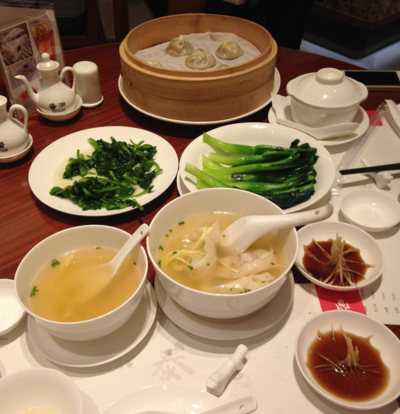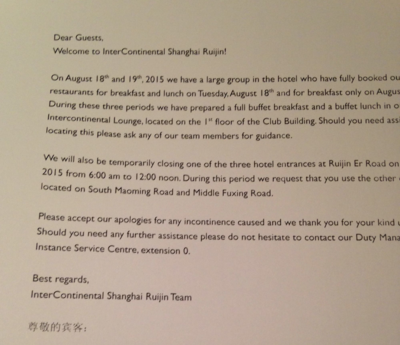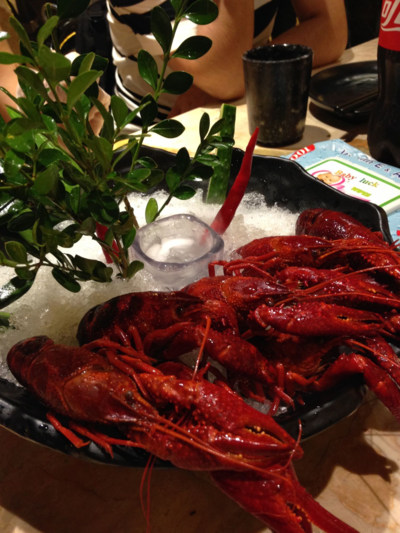On and off duty in Shanghai
By THEA LENARDUZZI
"I've already tried fish lips, thanks", I said, with relief, to my friend from the Shanghai Review of Books last week. "Canton greens and ginger instead?"
I was in town for the Shanghai International Literary Festival, a week-long series of talks, readings, panel discussions and presentations, now in its fifth year. The dim sum lunch pictured above (my paltry photography doesn't do it justice) followed a television interview and a trot around the hundreds of stalls filling the Shanghai Exhibition Centre, an immense neoclassical edifice built in 1955 and christened the Sino-Soviet Friendship Building. (The same gift was made to a number of cities around the world, although the only other still standing is in Poland.)
The previous night, I had taken part in a typically wide-ranging "forum" on the significance, past and present, personal and political, of ���The Orient��� ��� my contribution to which was deeply indebted to two recent TLS reviews, of Christopher Frayling's The Yellow Peril: Dr Fu Manchu and the rise of Chinaphobia and of Patrick Hanan's translation of the early-nineteenth-century novel Shenlou Zhi (Mirage). Fellow panellists included, among many others, the Chinese-American writer Gish Jen; the Welsh writer Francesca Rhydderch, whose debut novel, The Rice Paper Diaries, is based on her great aunt's experience as a POW in Hong Kong during the Second World War; and the Chinese writer Jin Yucheng, whose novel Evanescent had just won the prestigious Mao Dun prize. (Jin seemed to relish one speaker's suggestion that his book ��� which is written in a hybrid of Mandarin and Shanghainese dialect, with delicate ink illustrations by the author ��� is ���untranslatable���.)
On Thursday came the Poetry Gala, at which thirty-odd invitees were asked to select and read two poems. One of mine was Larkin's ���Aubade���, plucked from the TLS's archive, which succeeded in depressing almost everyone. Yeats's ���When You Are Old��� was a popular choice, read twice ��� once in English and then again in Korean. We heard contributions from Taiwan and Germany, France and Japan, as well as China, of course, interspersed with folk music from Moxizishi, who played a Kouqin, a southern Chinese mouth harp. The evening was filmed in its entirety to be broadcast on national television. It's almost impossible to conceive of such a show being made in the UK.
In between literary appointments and culinary (mis)adventures, I was free to roam and entertain myself. A favourite pastime during these off-duty hours was to wander through the city's French Concession, noting down restaurants and cafes with intriguing names or themes, from the does-exactly-what-it-says "Cheese + Chocolate" to the Wellingtonian "Beef and Liberty". There was also "Mr Bean Coffee", a memorabilia-packed coffee house nestled among the neck-cricking skyscrapers of the Pudong district, as well as "221B Baker Street" (cunningly located at 50 Ruijin Er Lu), which, at first glance, appeared to be Sherlock Holmes-themed, but on closer inspection, turned out to be a shrine to Benedict Cumberbatch.
To my colleague's compendium of felicitously mangled notices, I have this to add, which was slipped under my door one evening:
My week culminated in a discussion, with Professor Wen Jin, on ���Tradition and British Poetry���, in which we meandered from Anglo-Saxon verse to Geoffrey Hill and Eavan Boland, via Wordsworth and T. S. Eliot. Set in the intimate surroundings of the House of Literature in the Sinan Mansions, the event was well-attended (possibly something to do with an enormous billboard just down the road) and the audience was welcoming and engaged ��� even when I chattered away for a full ten minutes before realizing the need to allow an interpreter to fill everyone in. At the end there were questions on, among other things, the overlaps between nature poetry and realism, whether folk songs could be classed as poetry, and whether Simon Armitage had plans to publish in China. There was a cautious query, too, about the impact of censorship on poetry during the First World War.
And then it was time for yet another meal ��� the cutesy term ���baby lobsters��� making me feel only slightly guilty for eating an entire generation's worth.
Peter Stothard's Blog
- Peter Stothard's profile
- 30 followers







